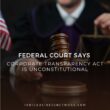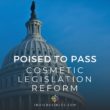Yesterday, the House Energy & Commerce Committee held a hearing entitled Examining The Current State of Cosmetics. For those who are new to my blog, or new to this issue, new cosmetics laws have been under consideration since 2008. You can read a lot of background and previous advocacy in the Advocacy section of this blog. You can watch the proceedings here.
The video is over three hours long, so please be patient while it streams from UStream servers.
I was not permitted to testify in person at the hearing, but my written testimony on behalf of IBN (PDF) was accepted into the record at the conclusion of the proceedings.
What follows is a brief overview of the issues discussed during the hearing. For those who are not familiar, here is the process. The lawmakers make statements first, and then the witnesses testify by reading their written testimony into the record. Lawmakers question each witness after his or her testimony has been delivered.
This post does not contain any of my own commentary, but is designed to give you an overview of the issues and a convenient place to watch the proceedings and read the testimony. It concludes with a list of the witnesses and PDF links to their written testimony.
By the way, none of these issues are brand new. Each has been raised in some fashion in previous bills or draft legislation.
Issues Raised
Each of the five witnesses testified individually. They were given five minutes, then were questioned by lawmakers. A whole host of issues are under consideration, but here are the main ones. (Of course you can get a better flavor by watching the proceedings and/or reading the written testimony linked at the end of this post.)
- Registration: whether cosmetics companies should have to register their facilities, formulas, and/or products with FDA. Currently registration is voluntary pursuant to the FDA's Voluntary Cosmetic Registration Program.
- Fees: whether the costs associated with new FDA Congressional mandates should be covered by industry user fees
- Good Manufacturing Practices: whether these should be codified into a new law. Currently, they are guidelines.
- Uniform standards: whether Congress should preempt (or essentially, prohibit) states from passing cosmetics laws that conflict with or are different from federal law
- Adverse event reporting: to what extent must cosmetics companies share with FDA reports of adverse events resulting from the use of a product
- Ingredient database and safety review: whether a national database of cosmetics ingredients should be established, and what entity (FDA, Cosmetic Ingredient Review, other) should be responsible for maintaining that database, and to what extent industry participants should be required to maintain a particular level of safety data
Witnesses and Testimony PDF Links
Michael J. DiBartolomeis, Ph.D, CIH
Chief Occupational Lead
Poisoning Prevention Program & California
Safe Cosmetics Program
California Department of Public Health
DiBartolomeis testimony
Michael M. Landa, J.D.
Director
Center for Food Safety and Applied Nutrition (CFSAN)
U.S. Food and Drug Administration
Landa testimony
Halyna Breslawec, Ph.D.
Chief Scientist and Executive Vice President for Science
The Personal Care Products Council
Breslawec testimony
Peter Barton Hutt, J.D.
Senior Counsel
Covington and Burling, LLP
Hutt testimony
Curran Dandurand
Co-Founder and Chief Executive Officer
Jack Black Skincare
Dandurand testimony
Debbie May
President and Chief Executive Officer
Wholesale Supplies Plus
May testimony
Donna Maria Coles Johnson
Founder & CEO
Indie Beauty Network
Johnson testimony (This testimony was written only, and was accepted into the record. I was not present at the hearing.)



